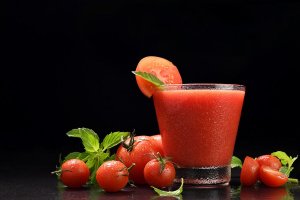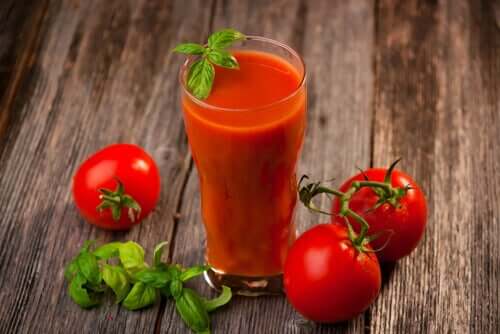Tomato Juice: Benefits and Disadvantages


Written and verified by the nutritionist Eliana Delgado Villanueva
Tomato juice is a popular drink that contains a wide variety of vitamins, minerals, and antioxidants. It’s particularly rich in lycopene, a powerful antioxidant with amazing health benefits. In this article, we’ll explore the advantages and disadvantages of consuming it.
The properties of tomato juice

Tomato is usually recommended in weight loss plans. One of the main benefits is its ability to act as a draining agent, the fact that it’s low in calories, and that it’s an excellent diuretic, which even can activate metabolism to help burn fat.
If you drink it regularly and in the early hours of the day, tomato juice helps start your days in the best possible way… Even more so when combined with a varied and balanced breakfast!
Nutritional value
Tomato juice is a popular drink made from fresh tomatoes. Here’s the nutritional information of 1 cup (240 ml) of tomato juice:
- Calories: 41.
- Protein: 2 grams
- Fiber: 2 grams
- Vitamin A: 22% of the RDA
- Vitamin C. 74% of the RDA
- Vitamin K. 7% of the RDA
- Vitamin B1. 8% of the RDA
- Vitamin B3. 8% of the RDA
- Vitamin B6. 13% of the RDA
- Vitamin B9. 12% of the RDA
- Magnesium. 7% of the RDA
- Potassium. 16% of the RDA
- Copper. 7% of the RDA
- Manganese. 9% of the RDA.
*RDA: Recommended Dietary Allowances
As you can see, tomato juice is very nutritious and contains many important vitamins and minerals. In fact, one cup of tomato juice almost covers the daily requirements of vitamin C and meets 22% of the vitamin A requirements as carotenoids.
The benefits of tomato juice
High concentrations of antioxidants
Tomato juice is a concentrated source of powerful antioxidants such as lycopene, a carotenoid hydrocarbon that has been linked to impressive health benefits.
Lycopene protects your cells from the damage of free radicals, thereby reducing oxidative processes in cells. Many studies have shown that drinking tomato juice rich in lycopene has health benefits.
You should also read: How to Remove Tomato Sauce Stains from Clothes
A weapon against constipation

Constipation isn’t something to be taken lightly. In fact, if left untreated, it can become chronic and lead to serious health consequences. A very simple way to fight it is to follow a diet that promotes intestinal transit.
Drinking tomato juice at breakfast is a great way to fight constipation. Tomatoes are rich in fiber and act as a mild laxative. Thus, if you drink it every day, it may help solve this common problem.
Cardiovascular qualities
It’s important to note that tomato is a great ally of heart health. In this regard, it contains powerful antioxidants, such as lycopene and beta-carotene, which help reduce the risk factors for these diseases. For example, blood pressure and high cholesterol or plaque buildup in the arteries (atherosclerosis).
A study of 584 participants found that those who followed diets rich in tomatoes had a significantly lower risk of heart disease compared to those who didn’t.
It helps boost the immune system
Finally, tomato juice helps boost the immune system to prevent and fight infections, the flu, and colds, among other conditions. Tomato is rich in vitamins C, A, B, D, and K, as well as antioxidants, potassium, calcium, phosphorus, and iron.
This article may also interest you: Why You Should Eat Homemade Tomato Sauce Every Day
Contraindications of tomato juice

However, there are a few things to keep in mind before grabbing a glass of tomato juice every morning. Here are some of them:
- If you suffer from mouth sores, you should avoid tomatoes, as they’re acid. Many people who undergo chemotherapy suffer from the side effect of mucositis, which causes inflammation and sores. Acidic foods such as tomatoes may worsen the pain this condition causes.
- For this reason, people with digestive alterations should avoid consuming tomatoes. Thus, if you suffer from esophageal reflux, heartburn, stomach ulcers, or underwent digestive surgery, it’s best to avoid consuming them.
- Due to its potassium content, tomato is also contraindicated in those who should restrict the consumption of this mineral. For example, this is the case of patients with kidney or heart diseases, insulin deficiency, or metabolic acidosis.
All cited sources were thoroughly reviewed by our team to ensure their quality, reliability, currency, and validity. The bibliography of this article was considered reliable and of academic or scientific accuracy.
- Ivanova NN, Khomich LM, Beketova NA. [Tomato juice nutritional profile]. Vopr Pitan. 2018;87(2):53-64. doi: 10.24411/0042-8833-2018-10019. Epub 2018 Feb 26. Russian. PubMed PMID: 30592869.
- Carr AC., Maggini S., Vitamin C and immune function. Nutrients, 2017.
- Cataño JG., Trujillo CG., Caicedo JI., Bravo Balado A., et al., Efficacy of lycopene intake in primary prevention of prostate cancer: a systematic review of the literature and meta analysis. Arch Esp Urol, 2018. 71 (2): 187-197.
- Jacques PF., Lyass A., Massaro JM., Vasan RS., et al., Relation of lycopene intake and consumption of tomato products to incident cardiovascular disease. Br J Nutr, 2014.
This text is provided for informational purposes only and does not replace consultation with a professional. If in doubt, consult your specialist.








